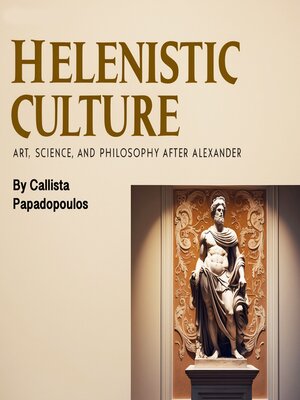Hellenistic Culture
audiobook (Unabridged) ∣ Art, Science, and Philosophy after Alexander
By Callista Papadopoulos

Sign up to save your library
With an OverDrive account, you can save your favorite libraries for at-a-glance information about availability. Find out more about OverDrive accounts.
Find this title in Libby, the library reading app by OverDrive.



Search for a digital library with this title
Title found at these libraries:
| Library Name | Distance |
|---|---|
| Loading... |
This audiobook is narrated by a digital voice.
The death of Alexander the Great in 323 BCE marked not the end of an era but the beginning of a revolutionary transformation that would reshape the ancient world and create the most cosmopolitan civilization yet seen in human history. The Hellenistic period, stretching from Alexander's death to the Roman conquest of Egypt in 30 BCE, witnessed the extraordinary fusion of Greek culture with the diverse traditions of the vast territories that had fallen under Macedonian rule, creating a new synthesis that preserved Greek intellectual achievements while adapting them to a dramatically expanded geographical and cultural context.
The immediate aftermath of Alexander's death created political chaos as his generals, known as the Diadochi or Successors, fought bitter wars for control of his empire while attempting to maintain the administrative and cultural systems that had enabled Macedonian rule over such diverse populations. These conflicts, while destructive in their immediate effects, ultimately established the framework for a new form of civilization that combined Greek political institutions, artistic traditions, and intellectual methods with the resources, populations, and cultural heritage of Egypt, Mesopotamia, Persia, and Central Asia.
The establishment of the major Hellenistic kingdoms—Ptolemaic Egypt, Seleucid Asia, Antigonid Macedonia, and later additions such as Pergamon and Bactria—created political entities that were simultaneously Greek in their ruling culture and cosmopolitan in their populations, generating unprecedented opportunities for cultural exchange and synthesis. These kingdoms, while maintaining Greek as the language of administration and high culture, necessarily incorporated local traditions, religious practices, and administrative methods that had proven effective in governing diverse populations across vast geographical distances.







